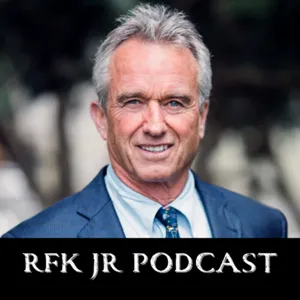Podcast Summary
Water protection advocate Nelson Brook discusses the southern water keeper movement: The southern water keeper movement is a unique blend of environmental activism and love for the outdoors, focusing on holding polluters accountable for clean water access
Nelson Brook, the Black Warrior Riverkeeper in Northern Alabama, is a passionate advocate for water protection, with a focus on holding polluters accountable through various environmental statutes. He represents a unique blend of environmental activism and a love for the outdoors, which is common among southern water keepers. The southern water keeper movement is stronger than many Americans might expect, and it's characterized by a strong hook and bullet tradition. Nelson explains that many people in the South, including himself, enjoy spending time outdoors but don't necessarily identify as environmentalists. However, there's a growing recognition that clean water is a right that everyone should have access to, regardless of political or religious beliefs. Unfortunately, in the South, polluters have been allowed to profit from pollution, often with the complicity of elected officials and regulatory agencies. As a result, water keepers like Nelson are working hard to educate the public about water quality issues and to hold polluters accountable.
Regulatory agencies may hinder enforcement of environmental laws: Regulatory agencies sometimes prevent citizens from enforcing environmental laws, but waterkeeper organizations have successfully held polluters accountable through legal action
In many cases, state regulatory agencies may not effectively enforce environmental laws against polluters, and may even take actions to prevent citizens from doing so. For instance, the speaker recounted an experience where the Alabama Attorney General signed a settlement with steel companies that had no penalties, effectively blocking a Clean Water Act lawsuit. This behavior is not unique to the south, and waterkeeper organizations, like the one the speaker works for, have to navigate these challenges to hold polluters accountable. Despite these obstacles, these organizations have won significant legal victories that uphold the right of citizens to enforce environmental laws when regulatory agencies fail to do so.
Efforts to Obstruct Environmental Enforcement: Despite the Clean Water Act and other environmental laws, some state agencies and industries attempt to block citizen enforcement efforts, undermining the intent of these laws to protect the environment.
Despite the historical significance of Earth Day 1970 and the passage of numerous environmental laws, including the Clean Water Act, there are still instances where state agencies and regulated industries attempt to obstruct environmental enforcement. For example, the Alabama Department of Environmental Management (ADEM) has reportedly tried to block water keepers from enforcing clean water laws. This is concerning because these laws were designed to empower citizens to take legal action when regulatory agencies fail to do so. The historical context of Earth Day 1970 and the subsequent environmental laws highlights the importance of maintaining strong citizen enforcement mechanisms to protect the environment when regulatory agencies become compromised. The Clean Water Act, in particular, includes a citizen supervision provision that allows citizens to prosecute polluters when the government fails to act. This provision is crucial for ensuring that environmental laws are effectively enforced and that the progress made since the 1960s is not reversed.
Holding Polluters Accountable: When State Agencies Fall Short: Environmental organizations take matters into their own hands to hold polluters accountable when state agencies fail to do so, collecting evidence and filing lawsuits to enforce regulations.
Environmental organizations like Riverkeeper often have to take matters into their own hands when it comes to holding polluters accountable due to the inadequacy of state agencies. After filing a letter of intent to sue, organizations can file a complaint 60 days later and collect their own evidence, making it harder for states to take their cases away. Unfortunately, state agencies are often more focused on protecting polluters than public health. Organizations like Riverkeeper go out and collect evidence by taking pictures, videos, and water samples, making it difficult for states to dispute their findings. The state's enforcement is often limited to paper letters and not real monetary fines or meaningful actions. This issue is not unique to Alabama but is prevalent in many captive agencies. Organizations like Riverkeeper are filling the gap left by underfunded and understaffed state agencies, ensuring polluters are held accountable for their actions.
Coal's Environmental and Health Threats: Coal's mining, burning, and waste disposal harm the environment and public health, making it the most expensive and damaging energy source compared to renewable alternatives.
The coal industry, particularly in Alabama and beyond, poses significant threats to the environment and public health, both locally and globally. From mining methods like strip mining and mountaintop removal, to the burning of coal for electricity or metallurgical coal for steel production, coal's impact is felt throughout the entire process. The toxic coal ash generated by power plants, as well as the transportation of coal around the world, add to the problem. Despite its heavy subsidies, coal is the most expensive and damaging energy source compared to renewable alternatives like solar and wind. The coal industry's true costs, including environmental damage and health effects, far outweigh its benefits. We must transition to cleaner, more sustainable energy sources to protect future generations from the negative consequences of coal.
The coal industry's disregard for the environment and public health: The coal industry's reliance on corrupt subsidies and resistance to change has led to decades of damage to ecosystems and human health, with massive cleanup costs and future consequences.
The coal industry's adherence to corporate crony capitalism, with its reliance on corrupt subsidies, has led to a lack of regulation and prioritization of environmental and public health concerns. This is particularly evident in the handling of coal ash, which contains toxic contaminants like mercury, arsenic, lead, and cadmium, and is often stored in unlined impoundments near waterways. The industry's resistance to change has resulted in decades of damage to ecosystems and human health, with many coal companies going bankrupt and leaving behind massive cleanup costs. Regulations are finally catching up, but the damage has already been done, and future generations will continue to bear the consequences. It's a sad reality that the coal industry's disregard for the environment and public health has come at a tremendous cost, and it's a cost that will be felt for generations to come.
Coal ash and its impact on freshwater ecosystems: Despite regulations, coal ash continues to harm freshwater ecosystems, limiting activities and posing health risks. Environmental advocates work to protect and hold polluters accountable.
Despite important environmental regulations like the Clean Air Act and Clean Water Act, coal ash remains a significant toxic waste issue, leading to dangerous levels of pollutants in freshwater fish and limiting activities like fishing for future generations. The speaker expresses frustration with the lack of leadership to uphold these statutes and the continued exploitation of loopholes by polluters and corrupt politicians. However, the speaker remains hopeful and motivated by their love for their home state of Alabama and the importance of their work as the Black Warrior Riverkeeper to protect the environment and hold polluters accountable. Despite the challenges and depressing realities, the speaker recognizes the importance of their role and the opportunities for impact in their community.
Laying the groundwork for future generations: Join Ellison Brooks in his mission to protect Alabama's Black Warrior River by donating, volunteering, or spreading the word about the Waterkeeper Movement.
Ellison Brooks, the Black Warrior Riverkeeper in Alabama, is deeply committed to his work because he believes it makes a difference, not just for himself, but for future generations. He sees his role as laying the groundwork for solving environmental issues that won't be fully addressed in the present. The Black Warrior River Keeper is a small, membership-based nonprofit organization that relies on donations and volunteers. Supporters can get involved by visiting their website, blackwarriorriver.org, or connecting with them on social media. Brooks expressed his gratitude for the community's support and encouraged everyone to lend a hand in any way they can, whether through monetary donations, volunteering, or spreading the word about the Waterkeeper Movement. As a passionate advocate for environmental causes, Brooks also shared his love for books related to Alabama and its history. Overall, his dedication to the cause and the impact it will have on future generations serves as a powerful reminder of the importance of taking action towards positive change.






